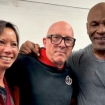Justin Chancellor was hanging on for dear life. There he was, onstage in front of a massive audience, playing the new Tool song "Descending" for the first time. "You're standing there with your trousers around your ankles the first time — at a festival in front of 40,000 people, playing a brand new song that's nine minutes long," he says. "So it was a little nerve-wracking but incredibly rewarding to be brave enough just to do that. No one's heard it. No one's approved it. You're just believing in what you've done and saying, 'This is what we did.' It's do or die."
Chancellor faced a similar situation nearly 25 years ago, when he was asked to audition to be Tool's new bass player. Original bassist Paul D'Amour split in 1995, shortly before the recording of the group's landmark album Ænima, but the other members of Tool had been impressed by Chancellor's playing in Peach, the British art-metal band they'd just toured Europe with. The English musician was at his apartment in London when he got the call. "I actually said no because I was terrified," he recalls with a laugh. "I made up some bullshit excuse like, 'I can't leave my dog,' or something like that. But then my brother basically came over and just kicked my ass. He said, 'You're out of your mind. This is everything you want. You better call them back right now.' So I had to kind of crawl back with my tail between my legs and go, 'Actually, would you mind if I did come and try?'"

TOOL TEASED "DESCENDING" QUITE A WHILE AGO BY PLAYING SMALL PIECES OF IT LIVE. EVEN THAT WAS ENOUGH TO WHIP YOUR FANS INTO A FEEDING FRENZY. THERE'RE NOT MANY BANDS THAT CAN DO THAT THESE DAYS. WHAT DO YOU THINK THAT SAYS ABOUT TOOL AND YOUR AUDIENCE?
JUSTIN CHANCELLOR I just think they believe in us. There's a real faith and a real loyalty, and I think the fans understand how sincere it is. We're not trying to just drag people along. It really is a precious gift that we were able to play a little bit of something, even though they're waiting for ages for the completed album. And they're still appreciative of just those little things because they know we're working hard to produce something beautiful. So the patience and the loyalty is flattering. It's a wonderful thing to have, and it gives us a lot of strength as a band.
THE NEW SONGS ARE QUITE LONG. YOU GUYS AREN'T STRANGERS TO LONGER SONGS, BUT DID YOU HAVE THE IDEA TO PUSH OR EXTEND THINGS AS FAR AS THEY COULD GO THIS TIME?
I think that's an idea that's always appealed to us — to let something go where it wants to. If you listen to classical music, it's more like that. I'm a big Beethoven fan, and you'll struggle to find a three-minute song on any of his stuff. [Laughs] You can be really good at making a pop song — you can have a hook and make it catchy. That's a technique that people use, but I think we prefer to see where something goes and patiently follow the thread. Often we'll have a group of ideas that we've decided are gonna go together, and sometimes one of those ideas, we're convinced it should be in that group, but we don't know how to get to it, how to fit it in. So sometimes we just end up meandering around until we get to a place where it suddenly makes sense to drop this particular riff or piece into the song.
WHAT DO YOU SEE AS THE ADVANTAGES OF WORKING THAT WAY?
It's weird. It creates a different kind of atmosphere full of surprises. It's almost like flying through space and suddenly you arrive at a planet. So, to us, there's never been an issue with a length of a song. Obviously, it's a bit challenging with the radio and stuff, because they wanna cut it down and give other things their fair amount of time, but we've never wanted that to restrict us. So we give it to the radio and they end up editing it themselves. Not thinking that way allows us to be purely creative.

YOU MENTIONED CLASSICAL MUSIC EARLIER. DO YOU GUYS THINK IN TERMS OF MOVEMENTS OR SUITES WHEN YOU'RE WRITING?
Yeah, a little bit. There's themes that string along through the whole thing that you'll notice — recurring themes that require different layers as it goes, or, alternatively, themes that get stripped down to the bare minimal thing that was in there the whole time, but you don't really see it for what it is until it's been stripped apart. Or it's being treated different ways on its way to becoming this pure, solid idea, which can become very powerful. Sometimes it'll go the other way and get completely complicated and crazy and almost disintegrate into space at the end.
I find that a lot of classical music has that affect, with so many layers and instruments going on. But even if you listen to Beethoven's piano sonatas, it's just one piano, but it's equally kind of complex. It's an exploration.
WHAT WOULD YOU WANT THE LISTENER TO GET OUT OF THE EXPERIENCE OF LISTENING TO THE NEW ALBUM?
Oh, god. [Laughs] I listen to totally different music than Tool, so that's difficult. The last thing I do is go and listen to heavy rock music. But I love electronic music. The purity of the tones is inspiring, because it's obviously much more controlled than a guitar tone. I often use that as a goal — if you can get anywhere near some of the sonic clarity in that stuff, then you're really getting somewhere. But it's hard to do. It puts you out of that idea of the rock world. It's not so emotional, perhaps. It can be, but a lot of it is more technical. But it's very emotional being in Tool and writing these songs, going in every day and struggling with each other and fighting with each other and patting each other on the back and laughing and crying. It's a very emotional process. So a lot of the relief comes from listening to some really banging techno. [Laughs]
YOU, ADAM AND DANNY CREATE A MUSICAL FOUNDATION THAT IS NECESSARILY COLORED BY MAYNARD'S LYRICAL CONTRIBUTION. HOW IMPORTANT IS IT FOR YOU TO BE ABLE TO STAND BEHIND WHATEVER HE'S SAYING?
Obviously, he's in different bands and it seems that he approaches each of them a different way. Or at least he reacts to the different music completely differently. But whatever he does, I always find it to be very open. Like a good poem, you can interpret it all kinds of different ways. I always find what he says very poignant to what we're doing. You can almost say that he's talking about the whole process that we're in. But on another level, because of its openness and its poetry, it can also relate to the whole world on a much bigger scale.
DOES HE DISCUSS HIS LYRICS WITH YOU AS HE'S WORKING ON THEM?
We do talk about it, and once we're into tracking and he's doing his vocals, he'll give us a little breakdown of the rough idea. But he also makes the very important point that it's just his interpretation and the idea is that everyone should be allowed to feel what they wanna feel from it. You don't want to explain it away, because then it sort of dies if you just have a fundamental meaning. So he gives us bits and pieces, but I quite enjoy listening and trying to figure out what's going on myself.

IT'S APPARENT THAT ONE OF THE RECORD'S THEMES CONCERNS GETTING OLDER. YOU'RE ALL 13 YEARS OLDER THAN YOU WERE WHEN THE LAST RECORD CAME OUT. DOES THE RECORD OR THE BAND SEEM MORE MATURE TO YOU?
Yeah, this record feels really complete. It took a long time — they've all taken a long time — but I've never felt so satisfied that we did everything we wanted to do. We didn't get to any point and settle, like, 'Well, we can't figure it out so let's just leave it at that.' I think I can say that on previous records, I wish I'd fought a bit harder for this or that. I don't know how the other guys feel. I think we did everything the way we wanted to do this time, and that's something that comes with maturity. You have to be completely brave and sincere about what you're doing to just not ever compromise and change it to what you think someone else might want.
AT THE SAME TIME, YOU'RE THE YOUNGEST MEMBER OF TOOL BY QUITE A FEW YEARS. DOES IT EVER FEEL THAT WAY?
[Laughs] Lucky me, yeah — I'm 48. The other guys are a little ahead of me. I think I used to feel it a bit more. As the years go by, I feel much more on an equal footing as far as personal maturity. But as far as intellectually and creatively and musically, I think everyone's always respected each other pretty evenly. Age never really comes into it very much. And we're in a rock band, you know? [Laughs] It's not like we're in an office. It's a great job. But we do joke about it. We're on the road and obviously that gets a little harder on your body as you get older. So the physical aspect is one thing, but the rest of it is kind of a young man's game, you know? It keeps us young.
YOU'VE BEEN IN THE BAND FOR NEARLY 25 YEARS. DO YOU EVER STILL FEEL LIKE THE NEW GUY?
No, but we joke about that, too. [Laughs] I'll always say, "I'm the new guy!" But it's our band, and I'm fully a hundred percent part of it, so it never feels like that.
BASS IS A MUCH MORE PROMINENT INSTRUMENT IN TOOL THAN IT IS IN MANY ROCK OR METAL BANDS. WAS THAT PART OF THE APPEAL WHEN YOU JOINED?
I don't think I really thought about it too much. I used to aspire to being more of a traditional bass player, to be honest. People say I play it like a guitar — and I was a guitar player when I was growing up. I started learning when I was eight, and that's what I was fascinated with in my teen years. Someone gave me an opportunity to play bass, and at first it was more of a case of, "How am I supposed to do this?" And I'd end up doing things in a way that was more like a guitar player. There was something about the confusion in the style that really appealed to people, but meanwhile I was trying to be the opposite of that. I wanted to be a real bass player.
At some point, I just had to accept that I had my own style. So it's been exciting to have this unique role. Sometimes Adam will play his guitar more like a bass, and then I'll have this opportunity to play a guitar solo, but on my bass. [Laughs] It's a really cool, open situation where those four strings suddenly become a lot more. We don't have a wailing guitar with a low frequency supporting it — [the bass] kind of meanders in and out of all kinds of different areas. I embrace it now, but it was perhaps a bit of an accident to start with.

TOOL ALREADY HAD THE BEGINNINGS OF A FAIRLY RABID CULT FOLLOWING WHEN YOU JOINED IN 1995. WHAT WAS YOUR INITIAL IMPRESSION OF THAT, AND HOW HAS THAT IMPRESSION EVOLVED OVER THE LAST 20-PLUS YEARS?
It was a bit scary to me at first. Moving from London to L.A. and hearing about sacred geometry and all these crazy themes that were a part of the profile, I guess you'd call it, and some of it was quite dark. So I was trying to find my place in all that, which was kind of interesting. It was their band, so I was just basically there to help at first. So I didn't think too much about it because we were immediately working on an album. I just kept my mouth shut, to be honest. But then it all went out of control, really, once the Ænima album came out. I was blown away by the whole experience, constantly moving, and barely had time to think. Massive shows, touring constantly, being on a bus, the dream really happening and just ingesting the whole thing.
I think the fans have changed a bit over the years. I think it's become much more diverse. On this tour, it's been great to see young boys and girls from a different generation. To start with, it was a more traditional metalhead kind of crowd, and I think that's changed a bit over the years. Which is nice.








